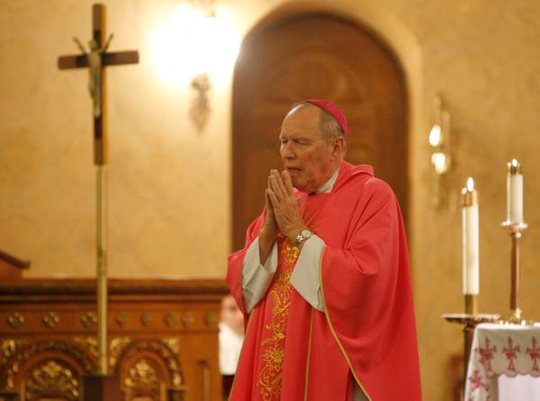Former Bishop Matthew Clark Ordered to Testify on Priest Abuse
By Steve Orr and Sean Lahman
A federal judge ruled Tuesday that Bishop Emeritus Matthew Clark must provide sworn testimony about the history of child sexual abuse in the Rochester diocese. Clark's attorney Mary Jo Korona had argued that his Alzheimer's disease left him unable to competently testify and said questioning him would place him under stress and worsen his symptoms. But after 20 minutes of oral arguments at a court hearing Tuesday, U.S. Bankruptcy Judge Paul R. Warren interrupted lawyers to say he had decided that Clark would have to sit for a deposition of three hours' length. Lawyers for abuse victims had asked for at least seven hours of questioning. It was the second significant ruling of the day in the Chapter 11 bankruptcy case, in which the diocese is seeking to resolve several hundred claims of child sexual abuse while retaining enough resources to continue its ministry. Earlier in the hearing, Warren ordered that all claims be filed with the bankruptcy court by Aug. 13. Lawyers and the judge spent 45 minutes discussing the fine print of a claims form that will be made available in the coming weeks to people who believe they were victimized in the past. The process for filing a claim is to be well-publicized so that as many victims as possible have an opportunity to file for compensation, lawyers said. The Aug. 13 bar date, as it's called, coincides with the end of a one-year window during which people can bring suit for past child sexual abuse under New York's Child Victims Act. 'Unique knowledge' Victims' lawyers are seeking information about past child sexual abuse to help them press their case for significant compensation of victims as part of the settlement of the Rochester diocese' s bankruptcy reorganization. Lawyers representing the diocese and its 82-year-old former bishop had argued that other diocesan officials are capable of answering questions about historic abuse cases. But lawyers for the victims said they believe Clark acquired personal knowledge of sexual misconduct by priests and other church ministers during his 33 years as Rochester's bishop. Acknowledging his Alzheimer's diagnosis, they expressed fears his dementia will worsen as time goes by and pressed for a deposition now. Warren agreed. "It's his unique knowledge on which the sun may set. That's the purpose of this deposition," he said after issuing his bench ruling. The deposition must be done in the next 30 days, Warren said, and must be done in accord with the time limit. "This is going to start and stop in one day. This will not go one minute beyond three hours," the judge said. Furthermore, he ordered that only one lawyer for the victims would be allowed in the room to question Clark. The former bishop's personal attorney and a lawyer for the diocese also can be present, as can Clark's physician or other aides whose role would be to monitor Clark's health. "The more people you put in this room, the more likely this is going to be a train wreck," Warren said in court. If the physician believes the questioning is harming Clark's health, he can ask the judge to intervene. Clark retired in 2012. The diocese announced in September he was suffering from Alzheimer's. A letter from Clark's neurologist, Dr. Anthony M. Maroldo, sought to explain the challenges that might occur during intense questioning. "His memory impairment limits his ability to assimilate and recall information presented in lengthy or complex questions and his ability to recall past events. His language impairment limits his ability to formulate clear, cogent and reliable responses to such questions," Maroldo wrote in a letter subjected to the court by Korona. But the victims' lawyers said that Maroldo's letter did not expressly claim that Clark was incompetent to testify. Warren concurred, and said the fact that Clark may be confused or irritated by the process was not enough reason to block the deposition. The victims' lawyers had asked that the deposition be videotaped, but Warren ordered that no video or audio record be made. A transcript of the interrogation will be made and eventually made public on the bankruptcy court docket. Written records Warren also ruled that Clark must turn over any diaries, notes, letters or other personal written records still in his possession that shed light on past abuse. That written material is distinct from the diocese's confidential personnel files, often called the sub secreto files, that the bishop keeps under lock and key. Victims' lawyers say those files often contain evidence of abuse by church ministers and attempts by higher-ups to protect the abusers. The diocese's lawyer, Stephen Donato, said "thousands and thousands" of these documents have been pulled from the diocese's files and are now being reviewed by a firm in India hired to redact names of victims and other personal information. That process should be completed in "a few more weeks," he said, after which copies of the records will be given to victims' lawyers. Sean Lahman is a watchdog reporter for the Democrat & Chronicle, part of the USA Today Network. Contact him at slahman@gannett.com or at 585-258-2369. Follow him on Twitter @seanlahman.
|
.
Any original material on these pages is copyright © BishopAccountability.org 2004. Reproduce freely with attribution.
